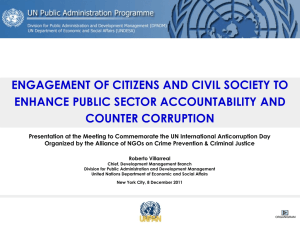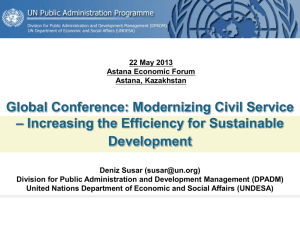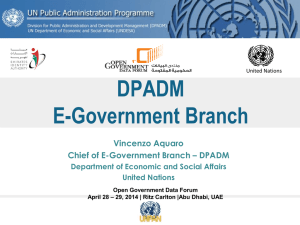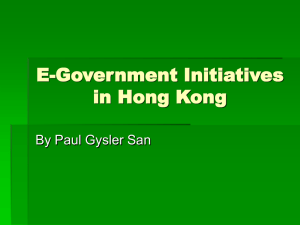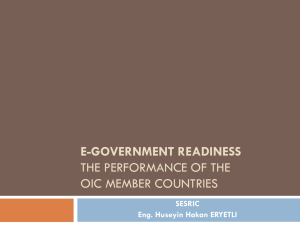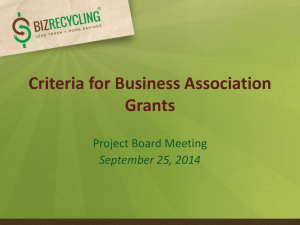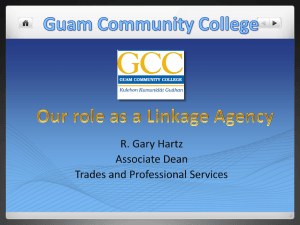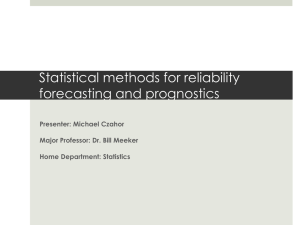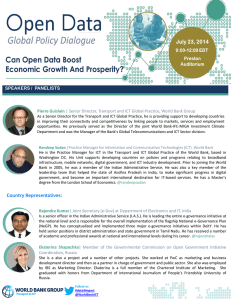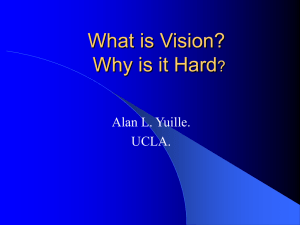Open Government Data
advertisement
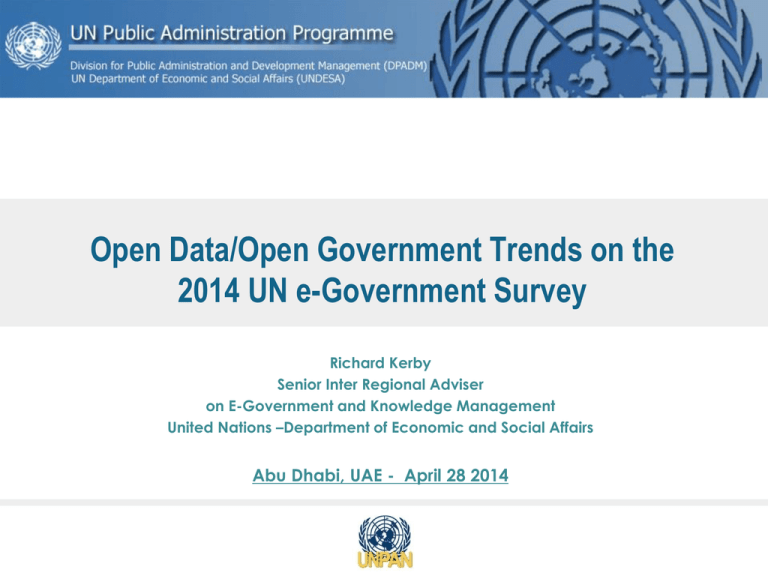
Open Data/Open Government Trends on the 2014 UN e-Government Survey Richard Kerby Senior Inter Regional Adviser on E-Government and Knowledge Management United Nations –Department of Economic and Social Affairs Abu Dhabi, UAE - April 28 2014 UN E-Government Survey The E-Gov Survey presents a systematic assessment of the use of ICT to transform and reform the public sector by enhancing efficiency, effectiveness, transparency, accountability, access to public services and citizen participation in 193 Countries. UN E-Gov Survey adopted by Member States and Economists as a useful tool to benchmark eGovernment Development UN Survey as a tool to guide policies and strategies on how Member States can overall improve public service delivery and bridge the digital divide. http://www.UNPAN.org/DPADM/ http://www.unpan.org/dpadm/ Part 2 - 2 The 4 Stages of Online Service Development The Assessment Questionnaire consists of 4 sections corresponding to the 4 stages of e-Government development Emerging Presence: Enhanced Presence: Transactional Presence: offering basic information on line … Greater sources, e-tools, e-services of information … Two ways interactive applications, financial and non financial transactions … Connected Presence: WoG, full interoperability, G2G, G2C,C2G … Most questions call for a binary response http://www.UNPAN.org/DPADM/ Part 2 - 3 6 Themes of the 2014 Survey E-Participation Whole-of-Government Multi-channel Service Delivery Expanding Usage Digital Divide and vulnerable Groups Open Government Data http://www.UNPAN.org/DPADM/ http://www.unpan.org/dpadm/ Part 2 - 4 Open Government Data Presence of links to national open data portal Datasets in non-proprietary formats (e.g. CSV instead of excel) Sectoral datasets Can public propose for new datasets http://www.UNPAN.org/DPADM/ Part 2 - 5 Open Government Data A vast majority of European Countries have Open Data on their National Portals Few European countries have datasets available in open standards from W3C such as Resource Description Framework (RDF) and SPARQL (Query Language for RDF) Some countries allow the public propose new datasets – Still a top down approach to providing Open Data Some countries provide support on how to use their data – Citizen Developers/Data Entrepreneurs are left on their own. http://www.UNPAN.org/DPADM/ Part 2 - 6 Open Government Data - Barriers Confidentiality Fraud Lack of Trust Data Integrity Power of Data No Legislations What is the person going to do with that data? http://www.UNPAN.org/DPADM/ Part 2 - 7 Open Government Data - Effects Transparency Accountability Trust in Government Open Government Better Decision Making Capability “What If” Business Intelligence Scenario Building Application Design GIS Business Intelligent http://www.UNPAN.org/DPADM/ Part 2 - 8 UN E-Government Survey http://www.UNPAN.org/DPADM/ 9 Example of EGDI dataset E-Government Development Index Country 2003 2004 2005 2008 2010 2012 2014 A 0.4108 0.3863 0.4017 0.4867 0.4280 0.4658 0.4562 B 0.3090 0.3790 0.4019 0.4509 0.4698 0.5328 0.4707 C 0.3466 0.3827 0.3978 0.3647 0.3637 0.4186 0.4198 D 0.5267 0.5675 0.5981 0.5679 0.5006 0.6167 0.6008 E 0.4588 0.4632 0.4475 0.4667 0.4796 0.6250 0.5042 F 0.5480 0.5417 0.5605 0.5719 0.5590 0.6132 0.5421 http://www.UNPAN.org/DPADM/ 10 http://www.UNPAN.org/DPADM/ 11 Country C increased its EDGI by 7% every review http://www.UNPAN.org/DPADM/ 12 Example of EGDI dataset Infrastructure Index Country 2003 2004 2005 2008 2010 2012 2014 A 0.0546 0.0542 0.0568 0.0725 0.0915 0.1786 0.2324 B 0.0590 0.0869 0.0926 0.1887 0.2505 0.3917 0.3998 C 0.0672 0.0647 0.0640 0.1082 0.1081 0.1873 0.2969 D 0.1738 0.1653 0.1644 0.2181 0.2538 0.3568 0.4668 E 0.2499 0.2333 0.2264 0.2653 0.2703 0.4550 0.3690 F 0.2069 0.2094 0.2522 0.3071 0.3370 0.5006 0.5941 http://www.UNPAN.org/DPADM/ 13 http://www.UNPAN.org/DPADM/ 14 Country B had implemented its Infrastructure Strategy in 2012 http://www.UNPAN.org/DPADM/ 15 http://www.UNPAN.org/DPADM/ 16 http://www.UNPAN.org/DPADM/ 17 Examples of Datasets http://www.UNPAN.org/DPADM/ 18 Open Government Data Open Data Elements Transportation Weather Stock Market Real time Data Statistical Data Elements Education Health Social Services Housing Etc. http://www.UNPAN.org/DPADM/ Part 2 - 19 Open Government Datasets - Education Class size Strong Math and Science Program Size of School Percentage of students that go on to College National Test Scores Arts Programme Advanced Placement Programs Campus Percentage of teachers with Masters Degree Diversity of Student Population Results of International exams to get into foreign schools http://www.UNPAN.org/DPADM/ Part 2 - 20 Open Government Datasets – My preferences Small class size Strong Math and Science Program Medium size school High Percentage of students that go on to College Advanced Placement Programs Diversity of Student Population Good results of International exams to get into foreign schools http://www.UNPAN.org/DPADM/ Part 2 - 21 http://www.UNPAN.org/DPADM/ 22 High Low High http://www.UNPAN.org/DPADM/ Medium 23 Open Government Datasets - Housing Community Size Average Income of the neighborhood Diversity of the neighborhood Recreational Activities – Parks, Restaurant, Playgrounds Older or younger neighborhood Mean Price of the houses Education Level of the neighborhood Size of the houses Average household size http://www.UNPAN.org/DPADM/ Part 2 - 24 Open Government Datasets – My Preferences Average Community Size Average Income $250,000 Diverse neighborhood Recreational Activities – Parks, Restaurant, Playgrounds Younger neighborhood Mean Price of the house – 750,000 High Education Level of the neighborhood (mostly professionals) At least 3 bedrooms http://www.UNPAN.org/DPADM/ Part 2 - 25 Medium Low High http://www.UNPAN.org/DPADM/ 26 Open Government Datasets – My preferences Small class size Strong Math and Science Program Medium size school High Percentage of students that go on to College Advanced Placement Programs Diversity of Student Population Good results of International exams to get into foreign schools Average Community Size Average Income $250,000 Diverse neighborhood Recreational Activities – Parks, Restaurant, Playgrounds Younger neighborhood Mean Price of the house – 750,000 High Education Level of the neighborhood (mostly professionals) At least 3 bedrooms http://www.UNPAN.org/DPADM/ Part 2 - 27 Medium High Low Low High High http://www.UNPAN.org/DPADM/ Medium 28 Open Government Datasets Health Employment Environment Agriculture Immigration Statistics Business http://www.UNPAN.org/DPADM/ Part 3 - 29 E-Government as enable for Government Transformation 3) Open government data as a new development resource OGD is recognized for meeting the rights of citizens, businesses and civil organizations to: 1. 2. 3. 4. access and use information, engage in policy making, Improve existing public services Co-create/create new public services. STRATEGIES • Need to develop conducive policy, legal and institutional frameworks to ensure that basic rights to information are available; • Strong cooperation between government agencies; • Strong political and top level vision and management; • Involving stakeholders and focusing on developing sustainable ecosystems for users. http://www.UNPAN.org/DPADM/ Part 3 - 30 E-Government as enable for Government Transformation 3) Open government data as a new development resource Develop a Business Case » » » » Financial Informational Content Use of Social Media STRATEGIES • Understanding what the customer is willing to use free of charge and what they are willing to pay for; • Work with Government entities to get a better understanding of the data; • What is the value added that you are providing to the data; • Determine the financial stability of your product. http://www.UNPAN.org/DPADM/ Part 3 - 31 SNAPSHOT – Gulf Cooperation Council Members (GCC) 2) Trend lines of e-government development, 2003 - 2014 0.75 GCC Average 0.7 Asia 0.65 World 0.6 Europe 0.55 0.5 Linear (GCC Average) Linear (Asia) 0.45 0.4 Linear (World) 0.35 Linear (Europe) 0.3 2002 2004 2006 • • 2008 2010 2012 GCC countries show an extremely fast growth in their E-Government Index; rapidly catching up with Europe. Since 2003, GCC has surpassed Asia and the World EGDI mean. 2014 New Elements for the Future All surveys data will be available in machine readable formats E-Government Toolkit – Create your own survey E-Tools available on the Survey Knowledge Base Update of future surveys through Crowdsourcing Feedback from Member States Open Government and Citizen Engagement will be strengthen Innovation will be an asset. http://www.UNPAN.org/DPADM/ 33 UAE Profile Implementation of the UAE Smart Government Strategy Vision and Leadership are moving UAE in the right direction in terms of e-Government EIDA will continue to play the leadership role in expanding the national ID card and developing open data sets. http://www.UNPAN.org/DPADM/ 34 UAE Profile Greater emphasis on Open Government Greater partnership with Data Entrepreneurs Continue to strengthen is citizen engagement activities Stay active on social media, especially with the new trends in the youth market http://www.UNPAN.org/DPADM/ 35 Recommendations and Remarks 1. E-Government development can strengthen national capabilities, support regional and national networks and provide stronger voice of citizens in global, regional and local negotiations and policy making. 2. Open Data offers an effective platforms to facilitate knowledge sharing, skills development and capacity-building for sustainable development. 3. Partnership with Citizen Developers/Data Entrepreneurs and the private sector will help support change programs and advance egovernment development. http://www.UNPAN.org/DPADM/ Part 3 - 36 Recommendations and Remarks 4. Customer centric approach should be used by Governments when implementing e-Government products 5. Governments across the globe need to undertake a process of transformative change. E-Government should be seen as a holistic process to transform government. 6. The transformative changes entail not only the design and implementation of innovative practices, but more fundamentally a transformation of government’s role, functions, institutional frameworks and processes. http://www.UNPAN.org/DPADM/ Part 3 - 37 Conclusions Governments need to undertake a process of transformative change for the future that requires to: Become catalysts for change instead of mere service providers; Become facilitators in promoting networked co-responsibility among all stakeholders by engaging and empowering communities to take part in the solution of their own problems; Allow for a competitive rather than monopolistic approach to provision of public goods and services; Become entrepreneurial in generating revenues and promoting partnerships; Results-oriented and customer-driven; Pro-active instead of reactive, i.e. anticipating problems and acting preventively; Learn and enhance capacity building through increased knowledge sharing http://www.UNPAN.org/DPADM/ Part 3 - 38 THANK YOU FOR YOUR ATTENTION! kerby@un.org - Email @richardkerby – Twitter http://www.UNPAN.org/DPADM/ Part 3 - 39
